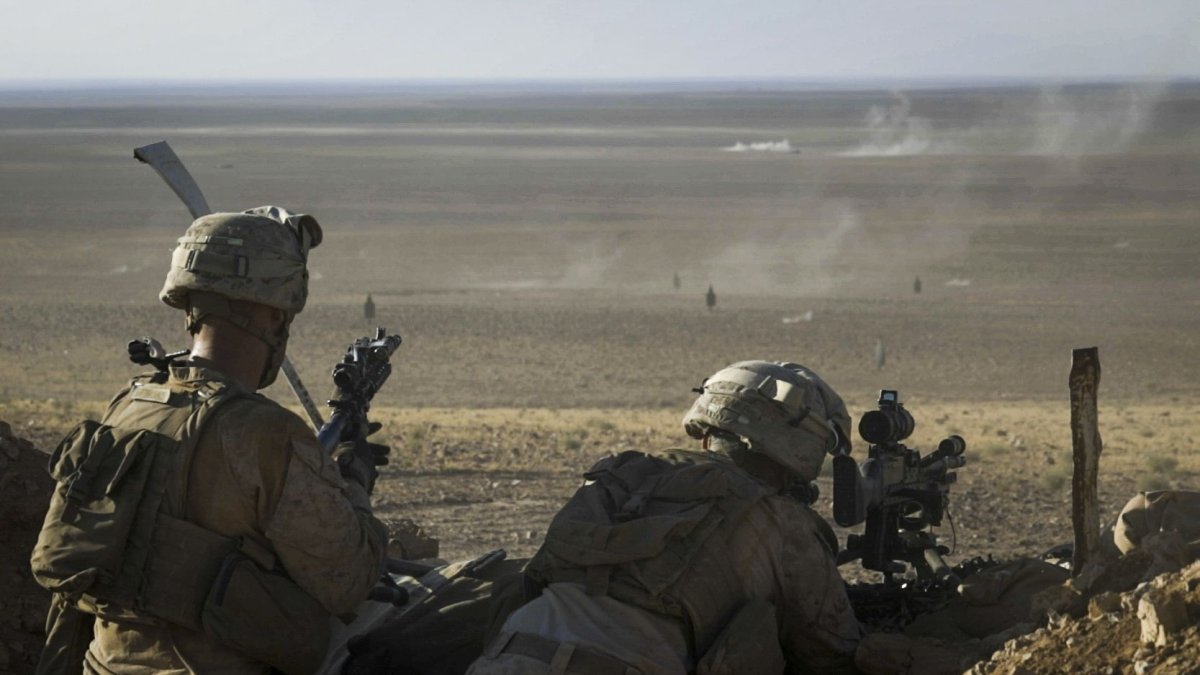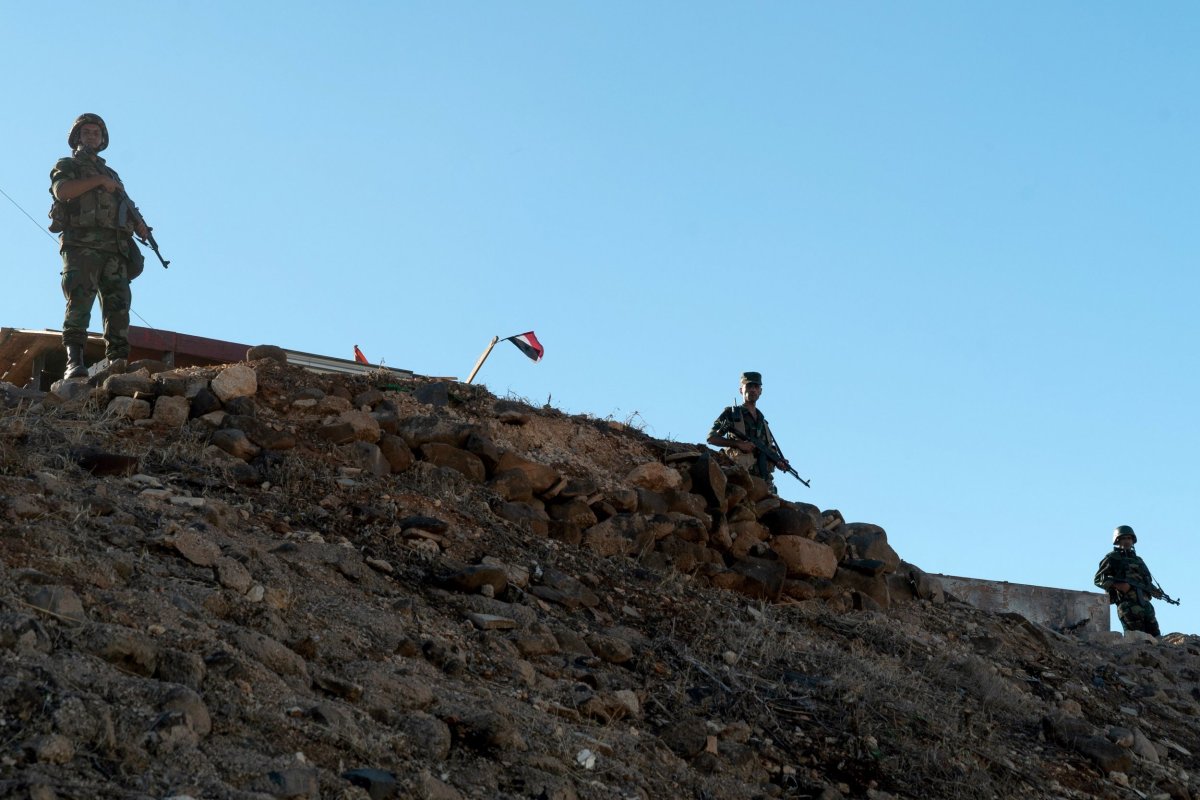The Syrian government and local activists tied to the opposition have accused the United States of targeting Syrian troops instead of the Islamic State militant group (ISIS), a charge denied by the U.S.-led coalition tasked with defeating the jihadi organization.
The Syrian Ministry of Defense first announced on Sunday that "American coalition forces fired several missiles at some of our forces' positions at Mount Al-Gharab, south of Al-Sukhna, and caused limited damage to equipment." The news came just as U.S-led coalition spokesman Colonel Sean Ryan told the media that the drone strikes—which originated from a U.S.-controlled military zone in southeastern Syria—targeted and killed ISIS commander Abu al-Umarayn, suspected of having executed U.S. hostage Peter Kassig in November 2014, along with "several other ISIS members."
Nevertheless, the Syrian Observatory for Human Rights, a U.K.-based monitor with ties to the Syrian opposition, appeared to corroborate the government with its own account published Monday. The report claimed that about 15 missiles had been fired from Al-Tanf, where the U.S. base was located, toward pro-government positions.
"The rockets targeted a stray column of regime forces in the Al-Halaba area, east of Al-Aliyanaya, which is located northwest of the Al-Tanf base, amid the secrecy of the international forces present at the base, while the Syrian fighters who are present there, launched rockets toward the area where regime forces were positioned," the observatory said, noting that there was "no information yet about casualties."

The latest potential international incident to plague Syria's more than seven-year-long civil war has once again displayed the complex dynamics of the overlapping battles in the conflict-torn country. The U.S.-led coalition was formed in 2014 to defeat ISIS, which had taken advantage of a 2011 rebel and jihadi uprising backed by the U.S. and regional allies to spread throughout Syria from neighboring Iraq, where the coalition is also bombing the group.
The Syrian government, backed by Russia and Iran, has largely defeated the Islamist-led insurgency and was also heavily involved in the fight against ISIS. Accused of war crimes, however, Syrian President Bashar al-Assad has been asked to step down by the U.S. and its coalition allies, though Western strikes have only deliberately targeted his government on two occasions, in response to alleged chemical weapons use by his armed forces against rebel-held enclaves.
Though both the Syrian military and U.S.-led coalition contributed to the fall of ISIS throughout 2016 and 2017, their rival missions collided at times. The U.S. killed dozens of Syrians soldiers fending off the jihadis in ISIS-besieged Deir Ezzor in what it later called a case of mistaken identity in September 2016. On several occasions throughout the following year and, most recently confirmed in February, coalition and unidentified pro-government militias clashed.
The Syrian military has been bolstered by a number of pro-government militias, including Shiite Muslim groups backed by Iran and Russian private military fighters allegedly operating independently of the Kremlin, which has sent tens of thousands of regular troops. The U.S. has deployed at least 2,000 troops to Syria, where they support the mostly Kurdish Syrian Democratic Forces in the country's north and east, and the rebel Maghawir al-Thawra group in the Badiya desert region of Al-Tanf.
Ryan said that the claims that Sunday's U.S.-led coalition operation near Al-Tanf targeted Syrian military forces were "false" and maintained that "the strikes were as the report stated and directed at ISIS," according to the Agence France-Presse.

Syria, Russia and Iran have called for the immediate dismantlement of the Al-Tanf base and the surrounding exclusion zone, considering this an illegitimate presence in the country. U.S. control over the Al-Tanf zone has also drawn controversy because it surrounds the Rukban refugee camp, where those fleeing the war have died of malnutrition after being denied assistance from neighboring Jordan, also a member of the U.S.-led coalition.
Al-Sukhna is located in Homs province north of Al-Tanf in an eastern stretch of government control near the frontlines of an ISIS-held pocket in eastern Homs and western Deir Ezzor. As the Syrian military and its allies combat the jihadis in this region west of the Euphrates river, the U.S.-backed Syrian Democratic Forces have waged a deadly campaign to take out ISIS on the other side of the crucial waterway in Deir Ezzor.
The claims of U.S. hitting Syrian military positions in the southeast also came on the heels of a suspected Israeli air raid or missile attack Thursday in the southwest. The Syrian military claimed to have shot down "hostile targets" with its defenses and, though the Israeli military denied claims that one of its warplanes had been downed, it neither confirmed nor denied on its involvement in the attack. Israel has bombed alleged Iranian and pro-Iran militia positions in Syria on over 200 occasions in the past two years alone, but Thursday's attack would be the first known instance after Russia sent improved S-300 air defense systems to the country.
Uncommon Knowledge
Newsweek is committed to challenging conventional wisdom and finding connections in the search for common ground.
Newsweek is committed to challenging conventional wisdom and finding connections in the search for common ground.
About the writer
Based in his hometown of Staten Island, New York City, Tom O'Connor is an award-winning Senior Writer of Foreign Policy ... Read more
To read how Newsweek uses AI as a newsroom tool, Click here.








